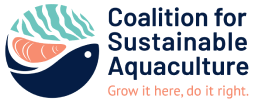The Coalition for Sustainable Aquaculture is proud to uplift the voices of our Future Leaders in this blog series: Meet a Future Leader. In this series we will interview the members of CSA that are Future Leaders set to make waves in aquaculture. We’ll learn what inspires them, what they hope to contribute to the world of aquaculture, and why they advocate for sustainable aquaculture.
Let’s chat with Olivia Blondheim, a Ph.D. student at the University of South Florida.
Tell us about yourself. What was your first introduction to aquaculture?

My name is Olivia Blondheim, and I am a marine ecologist, science communicator, and ocean policy advocate. Growing up in Maryland near Chesapeake Bay, my love for the ocean and appreciation for seafood started at a young age. I knew I wanted to be a marine biologist at five years old, and some of my fondest childhood memories include spending countless hours exploring the exhibits of the National Aquarium in Baltimore with my mom. We also often enjoyed seafood as a family around the dinner table, especially Maryland’s famous blue crabs!
While pursuing marine biology in college, I connected with fishing communities while traveling for research. Whether I was conducting research on jellies in Newport, Oregon, or studying abroad in Belize and Bonaire, the fishers I had the privilege of learning from always shared a deep reliance on and connection to the health of the ocean. Their understanding of the need to care for local marine ecosystems and fish sustainably to protect their livelihoods, families, and communities inspired me to pursue research that could benefit both the ocean and all of us who rely on it.
Now, I am currently pursuing my doctorate in biological oceanography at the University of South Florida College of Marine Science. My research focuses on the eastern oyster (Crassostrea virginica), which provides water filtration services for estuarine and coastal marine ecosystems along eastern North America and the Gulf of Mexico.

I aim to improve estimates of water filtration rates for oysters on natural and artificial substrates in urbanized estuaries. I am also experimentally evaluating whether oysters can diminish the severity of harmful algal blooms under warming ocean temperatures. This information will help local ecosystem managers make better decisions as to the value of oyster restoration and how to best improve water quality in urbanized estuaries.
I am also the Scientific Outreach Coordinator at the Gulf Shellfish Institute (GSI), a local non-profit that conducts research to improve shellfish restoration efforts and aquaculture. At GSI, I work with the Tampa Bay, Florida community to educate people about the benefits of oysters and oversee our vertical oyster garden (VOG) citizen science program. I’ve had the opportunity to learn from so many of the incredible farmers and how my research can be applied to help improve the resiliency of aquaculture in Florida.
What excites you about aquaculture?
As a scientist, I am excited about helping develop the research necessary to ensure that future developments in aquaculture, such as open ocean aquaculture, are science-based and sustainable. This starts with developing and applying restoration tools to ensure that our waters are as healthy as possible to support this expanding industry. Additionally, this research will allow us to improve the resiliency of U.S. aquaculture in the face of climate change, like warming ocean temperatures.
As a science communicator, I am motivated to help people understand the research behind restoring estuaries while also educating them on where their seafood comes from and how we can support aquaculture in the U.S. Through conversations with community members at outreach events, I have realized that people have a desire to connect with their estuaries while also supporting sustainable, local seafood.
The future of aquaculture in our country is going to rely on all of us working together to make sure that the science, education, and policy is in place to help all of our communities enjoy its benefits.
Why did you join the CSA as a Future Leader? Why do you think aquaculture is important, particularly in the U.S.?

I joined the CSA as a Future Leader because I was excited to learn even more about this industry from the incredible team at CSA. Having the opportunity to work and learn from policy experts, chefs, scientists, and industry leaders is such a privilege and a chance to provide a holistic approach to how we can best protect the advancement of sustainable aquaculture in the United States.
The United States has the largest ocean mileage of any country in the world and our Exclusive Economic Zone (EEZ) is larger than the land area of all 50 states combined. This means that there is a wealth of opportunity to use our knowledge, expertise, and experience to set the global standard of how to make sustainable aquaculture not only a part of our diets, but also an enduring part of our American culture.
When people understand the process of how seafood arrives on their plate, it helps inspire them to help take care of the marine ecosystems that support that seafood. When that seafood comes from local communities in the U.S., it makes those connections to each other and our country’s waters deeper and long-lasting.
